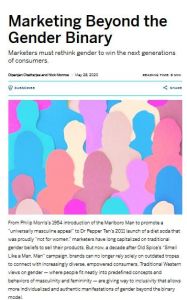
Marketing Beyond the Gender Binary
Marketers must rethink gender to win the next generations of consumers.
Recommendation
Concepts of gender identity are changing rapidly – and driving changes in consumers’ expectations. For brand marketers, this brings opportunities to know customers better and serve their needs more accurately as well as challenges to align marketing efforts with new and shifting gender concepts. Including numerous examples of brands that incorporate these new concepts with authenticity, Dipanjan Chatterjee and Nick Monroe from Forrester Research outline the necessity and rewards of embracing an inclusive view of gender identity.
Summary
About the Authors
Dipanjan Chatterjee is a vice president and principal analyst at Forrester Research, where he heads the brand strategy research practice. Nick Monroe is a researcher at Forrester and a doctoral candidate in sociology at Brandeis University.








Comment on this summary